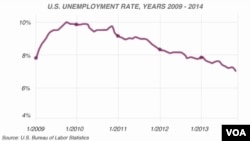WASHINGTON —
The world’s largest economy continued to build momentum - with better than expected job growth in November. The U.S. government says American companies hired more workers than expected last month, cutting the unemployment rate to 7 percent, which is the lowest level in five years. Despite a steadily improving job picture, though, some doubts remain about the sustainability of the U.S. recovery.
American businesses added 203,000 jobs in November. That works out to a four-month average of more than 200,000 hires per month.
The last time unemployment was this low was five years ago. Bankrate.com’s Mark Hamrick said this month's drop in unemployment was different.
Speaking with VOA via Skype, he said, “This time it’s much different. We had labor force participation holding steady and we saw broad-based improvement in the job market. It wasn’t just some of those sub-standard jobs that we’ve seen in months past.”
That means gains in higher paying industries. Manufacturing added 27,000 jobs, construction gained 17,000. The average work week expanded, and hourly wages grew.
And despite a weak start to the holiday shopping season, hiring at shopping malls and department stores has been steady, according to the National Retail Federation's Kathy Grannis.
“Retailers are expected to hire anywhere from 702,000 to 750,000. Very much on pace with last year, so of course, with expected growth comes the opportunity for more hires,“ said Grannis.
Although there are worries that an improving U.S. outlook might hasten a pull-back of the central bank’s easy-money policies, the strong job growth was welcome news on Wall Street.
Whether the U.S. recovery has staying power, however, remains in doubt.
Hamrick said another budget stalemate in Congress could easily erase recent gains. “We do have some looming deadlines there, and I know that consumers are concerned about the dysfunction that has become seemingly commonplace in Washington.”
Congress faces a new budget deadline December 13. Without a bipartisan agreement on spending, the government could run out of money by January.
American businesses added 203,000 jobs in November. That works out to a four-month average of more than 200,000 hires per month.
The last time unemployment was this low was five years ago. Bankrate.com’s Mark Hamrick said this month's drop in unemployment was different.
Speaking with VOA via Skype, he said, “This time it’s much different. We had labor force participation holding steady and we saw broad-based improvement in the job market. It wasn’t just some of those sub-standard jobs that we’ve seen in months past.”
That means gains in higher paying industries. Manufacturing added 27,000 jobs, construction gained 17,000. The average work week expanded, and hourly wages grew.
And despite a weak start to the holiday shopping season, hiring at shopping malls and department stores has been steady, according to the National Retail Federation's Kathy Grannis.
“Retailers are expected to hire anywhere from 702,000 to 750,000. Very much on pace with last year, so of course, with expected growth comes the opportunity for more hires,“ said Grannis.
Although there are worries that an improving U.S. outlook might hasten a pull-back of the central bank’s easy-money policies, the strong job growth was welcome news on Wall Street.
Whether the U.S. recovery has staying power, however, remains in doubt.
Hamrick said another budget stalemate in Congress could easily erase recent gains. “We do have some looming deadlines there, and I know that consumers are concerned about the dysfunction that has become seemingly commonplace in Washington.”
Congress faces a new budget deadline December 13. Without a bipartisan agreement on spending, the government could run out of money by January.










